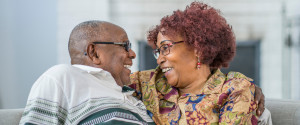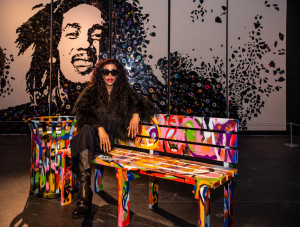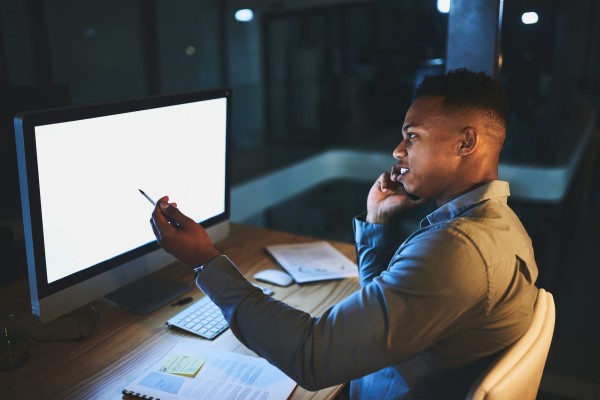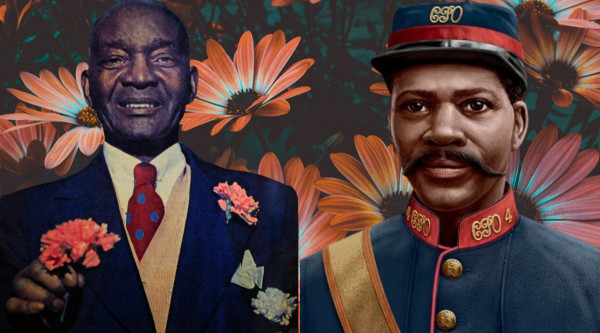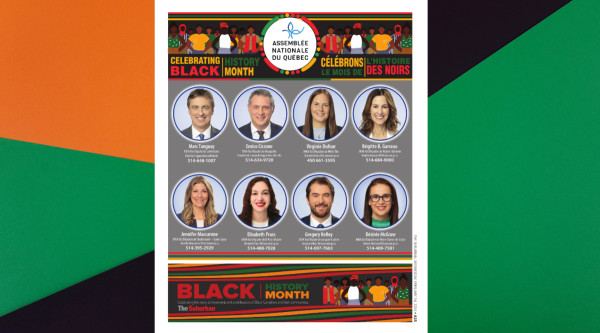Dorcas Marfo (DM): What influenced you to get into the political sphere and run for council in Mississagua?
Brennan Bempong (BB): I attended and spoke at the Black Lives Matter protest in June of 2020, after the death of George Floyd. One of my friends organized it, and then I attended. They didn't have anyone to speak, so I did all the speaking. I did a speech on the spot. Many community members kept telling me, ‘you should run for office.’ As a health care worker, I thought you needed a law or poli-sci background. So I put it aside and didn't think about it. As I kept getting more and more engaged in my community, I realized that a healthcare background is perfect for politics because healthcare is about taking care of people and being a politician should be about taking care of people.
So now I was trying to flip the narrative; instead of being about lawmakers and business people, it should be about taking care of others. That's what politics should be about. I've always had a background in law and philosophy because I always did well in those topics at school, and I still read them for leisure. So mixing my ability to reach people and take care of people with my ability to philosophize and have abstract ideas that aren't the norm puts me here. I’m on a path to becoming the first Gen Z Ward 10 Councillor.
DM: You mentioned you have a background in healthcare, tell me more about that. What does that look like, and how does that fit into your political engagement?
BB: I'm an orthopedic technician, so the people who put casts on you. I worked at many hospitals, including Trillium in Mississauga, Mount Sinai in Toronto, McMaster Children's Hospital in Hamilton, and Richmond Hill; broadly, I’ve been all around. I had to step away from my job in healthcare just because going door to door is extremely time-consuming.
DM: There are many things to learn as a candidate exposed on the frontlines. What has stuck out to you on this political journey?
BB: I've learned that many people aren't politically aware of what's happening, and that's very unfortunate. So most of the time, I’m not even talking about myself when I go door to door. I’m explaining the essence of politics. I'm doing one-on-one political classes, which is interesting, but at the same time, I shouldn't have to because if the current councillor had done that, then we can come in and discuss what a councillor is. A lot of people didn't know there was even a councillor.
Also, many people are pleased that I’m doing this and proud. When they find out I’m 25, they completely lose it. They’re like, ‘this is phenomenal, amazing and life-changing.’ People need change. When all the decisions are being made by one group of people, then everyone gets left out.
For the past election, Erin Mills, Mississauga, had a lower voter turnout than the rest of the province. So there are a lot of people thinking, ‘nothing can change.' So when someone says that to me at the door, I always put it back on them. ‘How would you change it?’ And if you're saying voting doesn't change it, what will you do? And then they realize that the problem is that we're sending candidates that we don't believe in. We need to send candidates we believe in, and once we send in the best candidate each time, all the candidates get better. It's like a positive feedback loop.
DM: Can you give me a run down of your politics 101 crash course? What are you being elected for? And what are some of the things you draw people’s attention to when you’re going door to door?
BB: We have federal, where Justin Trudeau and Jagmeet Singh are. Provincial, which just passed, is Doug Ford's election that he just was successful in. Then municipal is at the city level. Mississauga is divided into two: regional and city, but the councillor does both jobs. We elect one councillor for the Region of Peel and the City of Mississauga. Toronto runs it a bit differently. But in Mississauga-Peel, it takes care of the parks, roads, waste management, police services, ambulance, and programs and ensures people are aware of what's happening. Canvassing is going door to door, knocking on people’s doors, talking, and gathering information. At the municipal level, they don’t give you the voters list until September. I’ve been collecting it, getting to know residents' problems, and letting them know about me. There are 21,000 houses in Ward 10.
There’s a lot of need, and many of the problems people are bringing up are related to one another. It goes back to serving the person. So many people, when they run for office, try to say, ‘Oh, I'm gonna do this, I'm gonna do that.’ The first thing I ask is ‘what do you need to make the city better for you?’. So when flipped, my program has something for everyone. I want people to know that the political process involves all of us. It doesn't stop at the ballot; it's continuous.
The main thing that I keep telling people over and over is when I'm elected into office on October 24, we'll be having a thing called ‘the third space.’ So third space comes from ancient Greek civilization, where they would have engagements between the politicians and citizens every three weeks about what was going on. As Ward 10 councillor, I'll be doing that every three weeks to make people aware. So if people wanted to talk to me about their concerns with traffic safety or gas prices, we could have that discussion. Even though it doesn't relate to municipal government, people need to know what's going on and where their taxes are going. I will be implementing that as it has never happened before in Mississauga.
DM: You’re taking a new path challenging you in some of the most difficult, time-consuming ways. As a confident and knowledgeable person in this space, what are the issues that surface being a Black man in politics?
BB: Luckily for me, my region of Mississauga is already very multicultural. So Mississauga, as you know, based on the census, which people of colour tend not to fill, already states 63 percent are visible minorities. My region is a lot higher than 63 percent. I was born and raised here; I know most people here. So that aspect of racism doesn't apply here. It does in society overall, but it is not such overt racism in this instance. It's more covert, in the sense that some people expect certain things from me. My hair is braided or in an afro a lot of times. People say, ‘oh, you should cut your hair to look more professional.’ I say, ‘No, I shouldn't. Listen to what I say.’ Then they realize that it’s not how you look but how you behave with power.
As of the date of this interview, it’s only the current candidate and me. There's a 40-year age gap, and I don't see anyone else stepping in between that. So I love that because it shows people one end of the spectrum and then the other end of the spectrum. The other candidate is the polar opposite of me, so I like that dynamic, and pressure builds diamonds, so I'm built for the moment.
A lot of times, I've been told, ‘Oh, you're really smart. I'm not expecting that.’ So I always counter and ask, ‘So what were you expecting?’ They're expecting a Black man to have no brain, just a body. So I'm trying to continually change the narrative that's been flipped on Black men. I'm trying to show that many of us have the mind, and if we're given a fair opportunity that everyone else has been given, we can prove that. I've already proven that throughout this process.
DM: Walk me through the dynamic as a Ghanaian-Canadian. How has that influenced your political journey, and how did your family react to this decision?
BB: As a Ghanaian born in Canada, I see myself more as bicultural—two cultures are influencing me simultaneously. When you're born in Canada as a Ghanaian, they see you as too Canadian. Then typical Canadians don't see you as Canadian. They ask, ‘Oh, where are you from.’ So you're in the middle of the two cultures. I feel too Canadian for the Ghanaians and too Ghanaian for the Canadians. So I’ve felt what it means to not be home on either side of the spectrum.
Ghanian parents have a very linear perspective when it comes to life. It’s ‘go to school, work your job, have money and don't do anything else.’ So even going back to 2020 with the protest, they told me not to go. I went to the rally, and everything lined up. Then once they realized that I was likely to win this election because a lot of people in our community wanted a new voice, because Ward 10 has only had one voice for 16 years, they’ve slowly become more aware and supportive of my journey. As you know, with African parents, you have to do it, and then they follow along. You always get that pushback when you come up with anything new, so I've embraced that.
DM: Talk me through your campaign and team. How long has it been so far? What have your experiences been like engaging with the community? Are there any interactions that stood out?
BB: Nominations were filed on May 2nd, so it’s now six weeks into the campaign. It’s exciting. I wish I could clone myself, but I have phenomenal volunteers doing a great job on all ends of the spectrum. A lot of times, what happens at Ward 10 is that a community group will try to monopolize and alienate people, and then someone else will be able to run down the middle. I’m about bringing people together. I want us all to sit at the table and have a conversation. Mississauga is a mosaic, and all my volunteers are very diverse. I have Black youth and elders. Asian youth and elders. Arabic youth and elders. I have all people on all ends of the spectrum. I wouldn’t trade them for anything. No team in the world is better than the team I have.
When people tell me what I’m doing is amazing, I always remind people that I was able to do this out of my pocket. So now think about where your taxes are going and what they could do. I don’t offer conclusions; I offer processes. I want people to think about it in a grand scheme. It’s not just going from A to B. How do you get from A to B? I don’t consider myself a politician. I consider myself a community organizer who wants to expand on their great work and make our taxes work for us. I don’t look at what other politicians have done and figure out what works for me. I don’t identify with any political party. I consider myself innovative.
An interaction that I won’t forget is with two neighbours I visited. One was an extreme anti-vaxxer, and the other was pro-vaccination. I was able to get them together, and the first thing they agreed on was that I should be the next councillor. When I visit adjacent, semi-detached homes together, I ring both doorbells and stand in the middle. They both come out, and then we have a discussion. Regardless of vaccination status, we can all have respectful conversations.
I also had an interaction with someone who had never voted before. She’ll be 18 on October 21, so we spent some time conversing. She believed voting doesn’t change anything, but I reminded her that voting does change stuff through our conversation. She came out of it knowing that the first person she gets to elect will be someone who's there for her.
DM: If you can speak on this when you get into office, what are some of the first things you want to look at?
BB: A lot of things need to be fixed for Mississauga. A lot of simple fixes that are going to improve everyone's day-to-day life. One thing I can share because I've already done a public presentation on this is fixing Mississauga’s issue with parking. I gave a solution to the Mississauga Council on December 6, 2021, where I told them if we opened up the community centres and let people park there instead of on the side streets, we'd have more space, and we could generate revenue. As of now, they haven't implemented this idea. So that's one thing I want to get going.
DM: What message do you want to get to young people, especially Black youth, regarding getting involved in the elections?
BB: If you don't get involved, you're letting everything that came before you not matter. Black women only got the right to vote in Ontario in 1940. That's not as long ago as people want us to think. Plus, that's insane since we are inheriting this earth, youth in general. In 40 years, a lot of the people in office right now aren't going to be here, but we will. You don't want to wait until you're in your 50s before deciding to take ownership of your life. There's a reason that you're allowed at age 18 to be considered an adult. That means you're able to do certain things with it. With adulthood comes responsibility, and you don't want to wait until everything's too late before you stand up and say, I want to be counted.
Don't wait for someone to tell you to do something. If you feel it in your heart, do it. No matter what anyone says to you, voting is important. There's a reason that the group that votes the most, old rich white men, are the ones who are served the most by the community. You have to become a part of the process. Withdrawal doesn't fix anything. It just means you're allowing someone to make decisions for you. So don't let someone make decisions for you. And don't let the results of an election dictate whether or not you vote. You vote no matter what.
*This interview was revised for clarification.
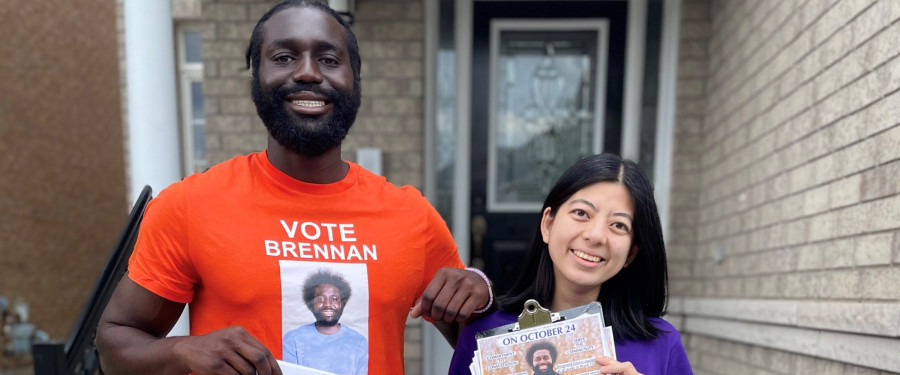
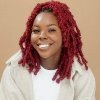 By
By 




